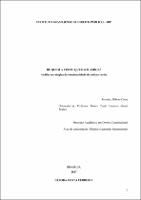Use este identificador para citar ou linkar para este item:
https://repositorio.idp.edu.br//handle/123456789/2406| Título: | De quem a corte quer ser amiga?: análise estratégica da funcionalidade do amicus curiae |
| Autor(es): | Ferreira, Débora Costa |
| Orientador(es): | Gonet Branco, Paulo Gustavo |
| Palavras-chave: | Amicus Curiae;Direito Constitucional;Jurisdição constitucional;Supremo Tribunal Federal - Brasil |
| Data de submissão: | 2018 |
| Editor: | IDP/ EDAP |
| Citação: | FERREIRA, Débora Costa. De quem a corte quer ser amiga?: análise estratégica da funcionalidade do amicus curiae. 2017. 119 f. Dissertação (Mestrado Acadêmico em Direito Público) – Instituto Brasiliense de Direito Público. Brasília: IDP/ EDB, 2017. |
| Resumo: | Apesar do grande entusiasmo doutrinário e jurisprudencial com que a figura do amicus curiae
foi acolhida no Direito brasileiro, pouco se investiga acerca da sua efetividade prática na
jurisdição constitucional, a ponto de se mostrar cada vez mais evidente um velado incômodo
com o funcionamento atual do instituto com relação à teoria. Nesse contexto, o presente estudo
analisa estratégica e empiricamente se o amicus curiae, para além do discurso doutrinário e
jurisprudencial, tem efetivamente desempenhado as funções de legitimação democrática e
ampliação da cognição do juízo, no sentido de aprimorar a qualidade deliberativa da corte, ou
se essa figura tem servido a outros interesses, tanto para a corte e quanto para os atores sociais
que dela se utilizam. Os resultados da análise empírica – relativo às ações de controle
concentrado de constitucionalidade com participação de ao menos um amicus curiae julgadas
entre 1990 e 2017 –, a corroborar os padrões identificados na análise estratégica, revelam que
a Suprema Corte faz o uso estratégico da figura do amicus curiae, ao citar mais aqueles tipos
que tragam maior apoio difuso para a corte perante a opinião pública (amicus curiae
representantes da sociedade civil) e ao se deixar influenciar mais por participantes com maior
poder de barganha institucional e credibilidade argumentativa e informacional (amicus curiae
governamentais). Conclui-se, assim, que a corte é “mais amiga” de alguns tipos de amicus
curiae do que de outros, sendo que, talvez, o maior deles seja o próprio Procurador-Geral da
República. Caso se deseje alterar esse cenário no sentido de ampliar a cognição do juízo propõese
que se estabeleça norma processual que determine que o peticionário antecipe
resumidamente os argumentos e informações que pretende apresentar e informe a parte que
deseja apoiar, o seu interesse na demanda e quem eventualmente patrocina a sua intervenção. |
| Abstract: | Despite the great doctrinal and jurisprudential enthusiasm with which the amicus curiae was accepted in Brazilian law, there is little investigation around its effectiveness in Supreme Court jurisdiction, in a way that is becoming more and more evident a veiled annoyance with the current functioning of the institute with respect to theory. In this context, this study analyzes strategically and empirically if the amicus curiae, beyond the doctrinal and jurisprudential discourse, has effectively performed the functions of democratically legitimizing and expanding background information of the court in order to improve the quality of your deliberative process or if this figure has served to other interests, both for the court and for the social actors who use it. The results of the empirical analysis – related to the cases of centralized system of judicial review with participation of at least one amicus curiae, judged between 1990 and 2017 –, to corroborate the standards identified in the strategic analysis, reveal that the Brazilian Supreme Court makes strategic use of the figure of amicus curiae, citing more of those types that bring greater diffuse support with public opinion to the court (amicus curiae representatives of civil society) and to be more influenced by participants with greater institutional bargaining power and argumentative and informative credibility (amicus curiae governmental organizations). It follows, therefore, that the court is "friendlier" to some types of amicus curiae than to others, and perhaps the best friend is the Attorney General himself. If it is desired to change this scenario in order to broaden the information and arguments available to the court, it is proposed to establish a procedural rule that determines that the petitioner briefly anticipates the arguments and information that he intends to present and inform the party which want to support, his interest in the demand and who eventually sponsors his intervention. |
| URI: | http://dspace.idp.edu.br:8080/xmlui/handle/123456789/2406 |
| Aparece nas coleções: | Mestrado Acadêmico em Direito Constitucional |
Arquivos associados a este item:
| Arquivo | Descrição | Tamanho | Formato | |
|---|---|---|---|---|
| Dissertação_Debora Costa Ferreira_DIREITO CONSTITUCIONAL_2017.pdf | 4.01 MB | Adobe PDF |  Visualizar/Abrir |
Os itens no repositório estão protegidos por copyright, com todos os direitos reservados, salvo quando é indicado o contrário.
